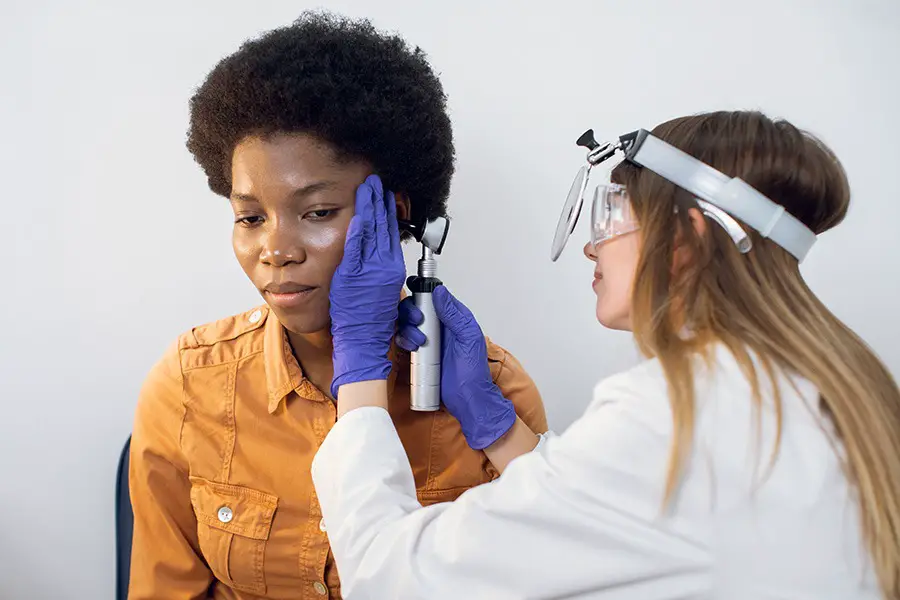Introduction
Meningitis intertwined with hearing loss can pose substantial implications on a person’s daily life. For those freshly diagnosed, the prospect of maneuvering through life with hearing loss induced by meningitis can seem overwhelming. This comprehensive handbook is here to embolden and motivate those who are affected, providing essential knowledge, tools, and coping mechanisms to deal with this dual condition. Ranging from the scientific background of hearing loss resulting from meningitis to recent progress in regenerative medicine, this manual offers the necessary support to confidently confront the hurdles of living with meningitis and hearing loss.
Delving into the Impact of Various Types on Hearing Loss
Meningitis Types on Hearing Loss It is crucial to understand different strains of meningitis and their potential influence on hearing for those recently diagnosed. Bacterial meningitis, triggered by bacteria such as Streptococcus pneumoniae, Neisseria meningitidis, and Haemophilus influenzae, is associated with a higher risk of hearing loss compared to viral meningitis, as the bacteria can harm the intricate inner ear structures, causing temporary or permanent hearing loss.
Viral meningitis, incited by viruses like enteroviruses, herpes simplex virus, and mumps virus, generally has less severity than its bacterial counterpart. Nevertheless, it could still result in hearing loss. Early diagnosis and appropriate treatment are paramount in reducing the risk of hearing loss from both bacterial and viral meningitis. It’s advisable to consult with healthcare professionals for the most suitable plan of action.
Emerging Prospects in Regenerative Medicine for Meningitis and Hearing Loss
Regenerative medicine carries immense potential for those affected by meningitis and hearing loss. Scientists are investigating stem cell therapy’s ability to repair damaged inner ear structures and restore hearing functionality. Preliminary studies have demonstrated that transplanting certain stem cells into the injured inner ear may regenerate hair cells, which are crucial for hearing.
Moreover, gene therapy has garnered interest in the field of regenerative medicine. This method involves introducing healthy genes into the inner ear to rectify genetic mutations or stimulate new hair cell growth. Although these therapies are still under research, they offer hope for future individuals dealing with hearing loss due to meningitis. Keeping abreast of advancements in regenerative medicine is crucial to stay informed about emerging treatment possibilities.
Revolutionary Technologies in the Detection and Management of Meningitis and Hearing Loss Technological advancements are transforming the detection and management of meningitis and hearing loss. Early identification of meningitis is vital to prevent complications, including hearing loss. Novel diagnostic tools, such as rapid diagnostic tests and PCR-based methods, allow quicker and more precise identification of pathogens causing meningitis, enabling timely treatment and potentially reducing hearing loss risk.
Managing hearing loss has seen remarkable improvement with modern hearing aids and cochlear implants, drastically improving the quality of life for those affected by hearing loss due to meningitis. These devices can be tailored to individual needs, providing superior sound quality and enhanced communication. Moreover, smartphone applications and other assistive technologies can further improve the experience for those living with hearing loss, ensuring greater accessibility.
QUIZ - AVAILABLE TREATMENTS FOR TINNITUS
The Overlooked Consequence of Meningitis: Understanding Hearing Loss Meningitis, a serious condition causing inflammation of the membranes surrounding the brain and spinal cord, can pose life-threatening risks. While the more prevalent symptoms like fever, headache, and stiff neck are well-known, the link between meningitis and hearing loss is often underestimated. Hearing loss can occur when inflammation damages the inner ear structures involved in sound processing, including the cochlea and auditory nerve.
Hearing loss can vary from mild to profound, and it could be either temporary or permanent, based on the infection’s severity and treatment effectiveness. Early intervention and appropriate medical care can reduce the
risk of hearing loss associated with meningitis. If you or someone you know is displaying symptoms of meningitis, it’s crucial to seek immediate medical assistance to prevent potential complications, including hearing impairment.
Managing Life with Hearing Loss Post-Meningitis Adapting to life after meningitis with hearing loss can be demanding, but with appropriate support and resources, leading a fulfilling life is entirely possible. If you are diagnosed with hearing loss due to meningitis, it’s vital to work closely with your healthcare team to devise an effective treatment plan. This may involve the use of hearing aids or cochlear implants, based on the severity of your hearing loss.
Beyond medical interventions, creating effective communication strategies and making necessary lifestyle adaptations is crucial. This could entail learning sign language, using assistive listening devices, or incorporating visual cues to facilitate communication. Establishing a robust support network comprised of friends, family, and professionals who comprehend your challenges is indispensable as you adapt to life post-meningitis with hearing loss.
The Mechanism Behind Hearing Loss
Due to Meningitis The root cause of hearing loss due to meningitis stems from the infection-triggered inflammatory response. This inflammation can result in increased pressure within the skull, damaging the blood vessels that nourish the inner ear. This disruption of blood flow can cause harm to the cochlea’s hair cells and the auditory nerve, leading to hearing impairment.
Moreover, the inflammation can extend to the inner ear, inflicting direct damage on the delicate structures responsible for processing sound. In severe cases, the infection could lead to scar tissue formation and calcification within the inner ear, further impairing hearing function. A comprehensive understanding of the science behind hearing loss due to meningitis can aid in developing prevention strategies and treatment options for those dealing with this condition.
Strategies for Living with Hearing Loss
Post-Meningitis Living with hearing loss following meningitis can be a challenge, but there are effective strategies to help you adjust and maintain a positive mindset. First, strive to understand your hearing loss and the resources available to you. This knowledge will allow you to advocate for yourself and make informed decisions regarding your care.
Additionally, foster a strong support network of friends, family, and professionals who can provide guidance and encouragement. You might also find joining a support group or connecting with others experiencing meningitis-induced hearing loss beneficial.
Finally, be proactive about your auditory health. Regularly schedule check-ups with your audiologist, and stay updated on the latest advancements in hearing technology. By taking ownership of your auditory health, you can regain control of your life and continue to thrive despite the challenges of post-meningitis hearing loss.
Conclusion
Living with the dual conditions of meningitis and hearing loss can be daunting, but armed with the right knowledge, support, and resources, it is possible to surmount these hurdles and lead a fulfilling life. By understanding various aspects of meningitis and hearing loss, such as the effects of different meningitis strains, developments in regenerative medicine, and effective coping strategies, those affected can manage their situation with resilience and determination. Stay informed, advocate for your needs, and build a supportive network of friends, family, and professionals to ensure the most favorable outcome on your journey with meningitis and hearing loss.

Decoding Silence: An Analytical View on the Advances in Conductive Hearing Loss Research and Treatment
This analytical article sheds light on conductive hearing loss, offering an in-depth exploration of its genetic factors, treatment advances, and promising experimental therapies.

Embracing the Melody of Life: Navigating the Journey with Conductive Hearing Loss
A blog post delving into the experiences and challenges of living with conductive hearing loss, discussing its impact on everyday life, social interactions, mental health, and the potential benefits of hearing aids and cochlear implants.





